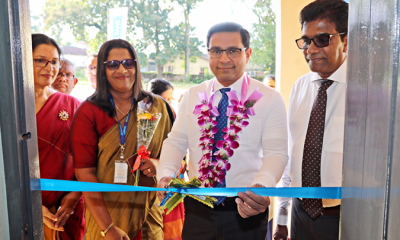Business
Sri Lanka and Bangladesh shouldn’t compete for the same objective: Bangladesh HC
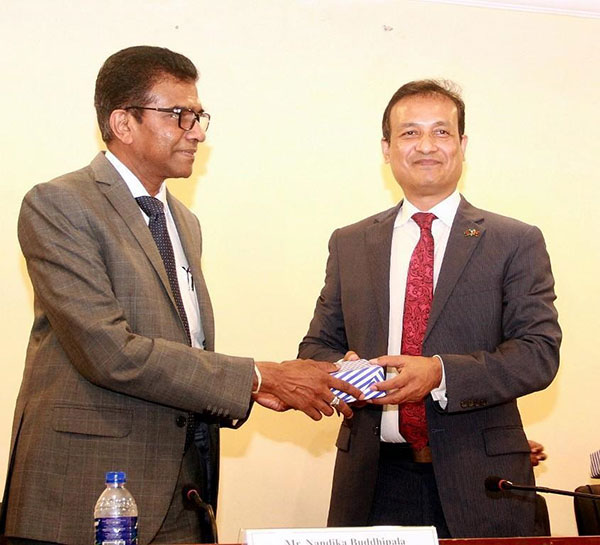
* Political stability has mainly driven the growth trajectory in Bangladesh
* Bangladesh is poised to capture a bigger share of the global apparel market
* More Sri Lankan businesses should tap the growth centre next door
* Draws attention to a great shortcoming in connectivity between the two countries
by Sanath Nanayakkare
Sri Lanka and Bangladesh can gain more from bilateral trade cooperation by strategically utilizing the two countries’ respective comparative advantages and strengths than from competing with each other for the same objective, Bangladesh High Commissioner in Sri Lanka, Tareq Md Ariful Islam said in Colombo recently.
“All the more so because the two countries have a similar product range which has led to a low bilateral trade volume of US$ 200-300 million,” he pointed out.
The High Commissioner made these remarks while addressing a bilateral trade and investment forum at the auditorium of the National Chamber of Commerce (NCCSL) where he was the special guest speaker.
“The similarity in our product range is the main reason behind low trade volume. However, there is a lot of scope for improvement in our trade ties. What we need to do is to couple our respective, comparative advantages and build resilient cooperation to be more competitive in the global market,” he observed.
“The two countries have just completed 50-years of diplomatic relationship.
It has been a long, enduring relationship based on friendship, goodwill and good neighborliness. Over these 50 years, we have enjoyed very strong bonds of solidarity and friendship. Our business ties are also very strong. Now we need to capitalize on our excellent political relations to make the business relationship stronger to make it more tangible, so that it can touch the lives of our people and also help Sri Lanka’s endeavors towards its economic recovery,” he said.
Presenting a comprehensive picture under the theme of the discussion, the High Commissioner went on to say:
“Sri Lankan business community would like to know what opportunities are available in Bangladesh for trade and investment, its government policies, macroeconomic data and how the Bangladesh High Commission in Sri Lanka can help them in this regard.”
“According to my view, preferential trade agreements (PTAs) or free trade agreements (FTAs) shouldn’t be seen through the lens of revenue earning or revenue loss. It means much more than that. While revenue loss and revenue gains are definitely important, there are many other benefits that PTAs and FTAs can bring to our economies; for example, creation of employment and enhancement of our respective competitiveness in the global market. So we should take a holistic approach to FTAs and PTAs. If we can judiciously select the respective tariff lines, then there is every possibility that a PTA or FTA between Bangladesh and Sri Lanka can be successful. We are very encouraged to see that the current government has put a lot of emphasis on PTAs and FTAs with bilateral partners. We started our negotiation late last year. So far we have made good progress, but we still have to do more.”
“Bangladesh initially received substantial investment from Sri Lanka; mostly in readymade garments sector and now Sri Lankan companies have extended into health, power, logistics, financial sector etc. Now they have diversified into investment banking, wealth management, paint, packaging, FMCG etc. This is an indication about the growing, diversified market in Bangladesh. Most of the conglomerates in Sri Lanka have very successful operations in Bangladesh and more Sri Lankan businesses are showing interest in doing business in Bangladesh.”
“Bangladesh has had consistently high economic growth. The average GDP growth in the last 30 years is 6.6% which is among the best in the world. In 2019, it reached 8.15% right before the pandemic. During the pandemic, Bangladesh had 5.4% growth which was among the highest in the world during Covid time. In financial year 2020-21 our growth was 6.9% according to the IMF. In 2021, it went up to 7.2%. The focus for 2022-23 according to the IMF is 6%, but we are hopeful of achieving higher growth. Our foreign debt to GDP is 11.86% and local debt to GDP is 31.42% which is the lowest in the region. Bangladesh is a USD 400 billion plus economy – 41 largest in terms of nominal GDP and 32 largest in terms of purchasing power parity. Per capita income has soared to USD 2,824. Foreign exchange reserves are now USD 34 billion. It was USD 44 billion last year and the decline was due to the rise in the prices of essential commodities in the global market.”
“We have sought an IMF package. We got USD 4.5 billion. This was not a bailout. It was to deal with balance of payment issues. Bangladesh’s Inflation is at a single digit of 8.9%. Remittance in 2019-2020 was USD 18 billion and even during the pandemic, it went up to USD 24 billion. Our exports crossed the USD 50 billion mark last year for the first time.”
“There is a winning combination of conditions for any potential investor or business house to do business in Bangladesh. The main driving force has been our political stability which has mainly helped the growth trajectory in Bangladesh. Ours is a domestic market with 165 million people and out of that, 37 million is the growing middle class whose per capita income is between USD 5,000 and 7,000. On top of that two million are joining the middle class each year.”
“Because Bangladesh has handled geo-politics well, it has become a sought-after destination for many regional business houses to relocate their establishments. We have special economic zones dedicated for Japan, India, China and South Korea. This shows that investment is safe and profitable in Bangladesh, therefore, Sri Lanka can further tap this growth centre next door.”
“Bangladesh is poised to capture a bigger share of the global apparel market. Sri Lanka can also contribute in that direction. Apparel industry of the two countries can utilize the comparative advantages in the production process, value addition in re-exports etc. We can utilize Sri Lankan expertise in this sector. Sri Lankans have helped take our readymade garments sector to where it’s today. Our apparel industry continues to benefit from your human resources.”
“Through cooperation, we can enhance our global competitiveness in our IT products. Manufacturing of pharmaceutical products and medical equipment also has more scope for investment.”
“About 700,000 Bangladeshis spend USD 3.5 million every year for overseas medical treatments. That’s a big market Sri Lanka can tap. Electronic components, agricultural food processing, leather and footwear, medical insurance, steel and cement, renewable energy, FMCG, retail operations, supply chain and logistics, financial sector are other sectors with opportunities for investment, supported by proactive policies of the Bangladesh government.”
“Although both countries are into tea, your global tea brands can partner with us in making fine blended tea, “he said.
The High Commissioner chose this forum to draw attention to a great shortcoming in connectivity between the two countries by sea and air which leads to the disadvantage of Sri Lanka tourism.
“Bangladeshis with disposable income travel to all regional destinations, but they are not coming to Sri Lanka because of the poor connectivity. If connectivity and affordability of air fares can be taken care of, Sri Lanka tourism can benefit from it,” he said.
In 2020, Bangladesh imported $153 million worth of goods from Sri Lanka while exports from Bangladesh to Sri Lanka stood at $ 48 million.
Business
IMF staff team concludes visit to Sri Lanka
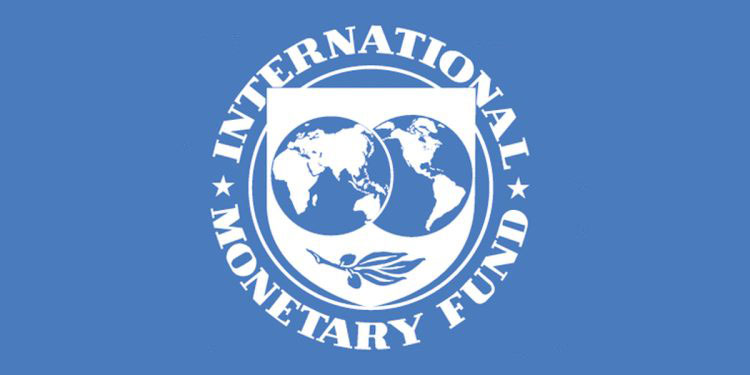
An International Monetary Fund (IMF) team led by Evan Papageorgiou visited Colombo from April 3 to 11, 2025. After constructive discussions in Colombo, Mr. Papageorgiou issued the following statement:
“Sri Lanka’s ambitious reform agenda supported by the IMF Extended Fund Facility (EFF) continues to deliver commendable outcomes. The post-crisis growth rebound of 5 percent in 2024 is impressive. Inflation declined considerably in recent quarters and has fallen to ‑2.6 percent at end-March 2025. Gross official reserves increased to US$6.5 billion at end-March 2025 with sizeable foreign exchange purchases by the central bank. Substantial fiscal reforms have strengthened public finances.
“The recent external shock and evolving developments are creating uncertainty for the Sri Lankan economy, which is still recovering from its own economic crisis. More time is needed to assess the impact of the global shock and how its implications for Sri Lanka can be addressed within the contours of its IMF-supported program.
“The government’s sustained commitment to program objectives is ensuring policy continuity and program implementation remains strong. Going forward, sustaining the reform momentum is critical to safeguard the hard-won gains of the program and put the economy on a path toward lasting macroeconomic stability and higher inclusive growth.
“Against increased global uncertainty, sustained revenue mobilization efforts and prudent budget execution in line with Budget 2025 are critical to preserve the limited fiscal space. Boosting tax compliance, including by reinstating an efficient and timely VAT refund mechanism, will help contribute to revenue gains without resorting to additional tax policy measures. Avoiding new tax exemptions will help reduce fiscal revenue leakages, corruption risks and build much needed fiscal buffers, including for social spending to support Sri Lanka’s most vulnerable. Restoring cost recovery in electricity pricing will help minimize fiscal risks arising from the electricity state-owned enterprise.
“The government has an important responsibility to protect the poor and vulnerable at this uncertain time. It is important to redouble efforts to improve targeting, adequacy, and coverage of social safety nets. Fiscal support needs to be well-targeted, time-bound, and within the existing budget envelope.
“While inflation remains low, continued monitoring is warranted to ensure sustained price stability and support macroeconomic stability. Against ongoing global uncertainty, it remains important to continue rebuilding external buffers through reserves accumulation.
“Discussions are ongoing, and the authorities are encouraged to continue to make progress on restoring cost-recovery electricity pricing, strengthening the tax exemptions framework, and other important structural reforms.
“The IMF team held meetings with His Excellency President and Finance Minister Anura Kumara Dissanayake, Honorable Prime Minister Dr. Harini Amarasuriya ; Honorable Labor Minister and Deputy Minister of Economic Development Prof. Anil Jayantha Fernando, Honorable Deputy Minister of Finance and Planning Dr. Harshana Suriyapperuma, Central Bank of Sri Lanka Governor Dr. P. Nandalal Weerasinghe, Secretary to the Treasury Mr. K M Mahinda Siriwardana, Senior Economic Advisor to the President Duminda Hulangamuwa, and other senior government and CBSL officials. The team also met with parliamentarians, representatives from the private sector, civil society organizations, and development partners.
“We would like to thank the authorities for the excellent collaboration during the mission. Discussions are continuing with the goal of reaching staff-level agreement in the near term to pave the way for the timely completion of the fourth review. We reaffirm our commitment to support Sri Lanka at this uncertain time.”
Business
ComBank unveils new Corporate Branch at Head Office
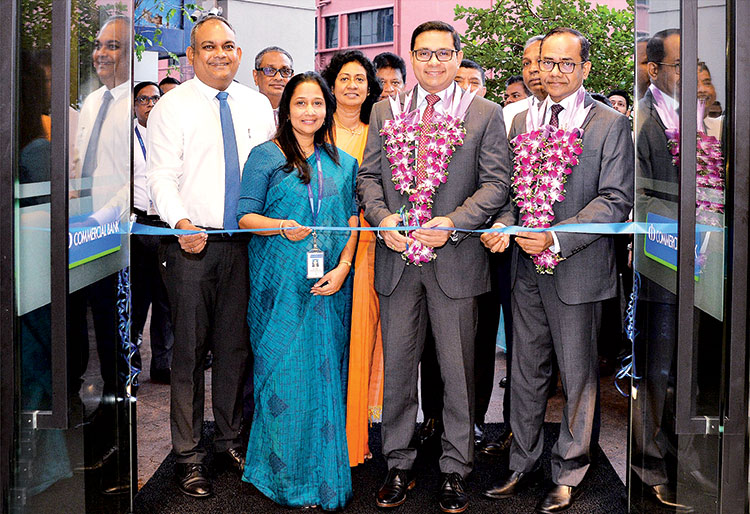
The Commercial Bank of Ceylon has transformed its iconic ‘Foreign Branch’ into the ‘Corporate Branch,’ reaffirming its commitment to delivering dedicated, comprehensive financial solutions to corporate and trade customers.
The Bank said this transformation represents a new milestone in its illustrious journey, and resonates with the rich commercial heritage of Colombo, a city that has long served as a vital trading hub in the region.
Strategically located at the Bank’s Head Office at Commercial House, 21, Sir Razeek Fareed Mawatha (Bristol Street), Colombo 1, this rebranded Corporate Branch stands as a first of its kind in Sri Lanka —a premier financial hub tailored exclusively to the needs of corporate customers, the Bank said. The transformation aligns with the Bank’s vision of providing unparalleled service excellence, bespoke financial solutions, and fostering long-term business partnerships.
Commenting on this strategic initiative, Commercial Bank’s Managing Director/CEO Sanath Manatunge stated: “It is our aspiration that just as the historic Delft Gateway, at which our Head Office is located, once opened the path to the Dutch Fort, our Corporate Branch will chart a new era of enduring and prosperous business collaborations, that will extend beyond Sri Lanka’s shores.”
Business
Fits Retail and Abans PLC Unveil Exclusive DeLonghi Premium Coffee Experience
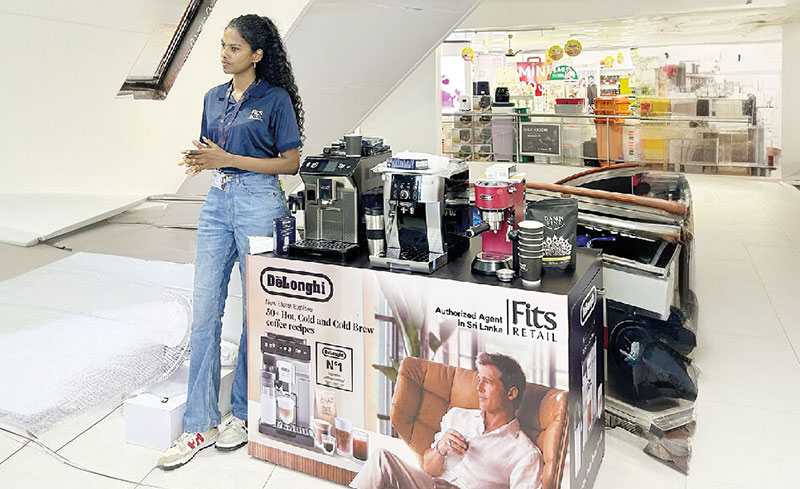
Fits Retail has partnered with retail giant Abans PLC to showcase the iconic DeLonghi coffee machines at two of Colombo’s most prestigious locations: Abans Elite Colombo 3 and Abans Havelock City Mall showrooms.
At these dedicated demonstration zones, visitors can discover the unparalleled precision engineering and user-friendly technology that have made DeLonghi machines the preferred choice for discerning coffee lovers in more than 46 countries worldwide. Renowned for consistently delivering café-quality espresso, cappuccino, and even specialty cold brews, DeLonghi machines exemplify Italian innovation at its finest.
Yasas Kodituwakku, CEO of Fits Retail, expressed excitement about the collaboration: “This partnership represents our unwavering commitment to bringing global coffee excellence to Sri Lankan connoisseurs. With Abans PLC, we’re creating more than just demonstration spaces; we’re curating premium destinations for an authentic coffee experience.”
“As pioneers of premium lifestyle experiences in Sri Lanka, our collaboration with Fits Retail aligns seamlessly with our vision of elevating everyday moments into exceptional experiences,” said Tanaz Pestonjee, Director Business Development at Abans PLC.
-

 News5 days ago
News5 days agoSuspect injured in police shooting hospitalised
-

 Features6 days ago
Features6 days agoRobbers and Wreckers
-
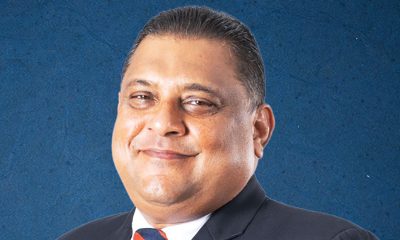
 Business6 days ago
Business6 days agoBhathiya Bulumulla – The Man I Knew
-

 Business5 days ago
Business5 days agoSanjiv Hulugalle appointed CEO and General Manager of Cinnamon Life at City of Dreams Sri Lanka
-

 Business7 days ago
Business7 days agoNational Anti-Corruption Action Plan launched with focus on economic recovery
-

 Features4 days ago
Features4 days agoLiberation Day tariffs chaos could cause permanent damage to US economy, amid global tensions
-
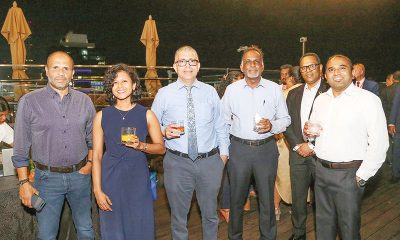
 Business4 days ago
Business4 days agoMembers’ Night of the Sri Lanka – Russia Business Council of The Ceylon Chamber of Commerce
-
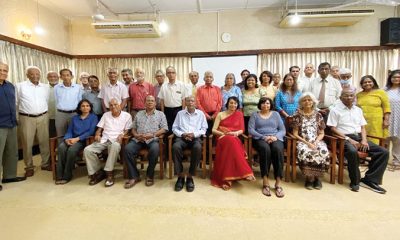
 Features4 days ago
Features4 days agoMinds and Memories picturing 65 years of Sri Lankan Politics and Society




